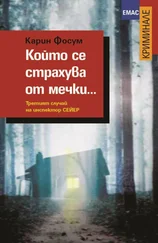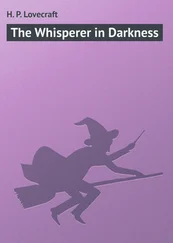‘And you never found an explanation? You never understood any of the signals?’ Sejer asked.
‘Yes, there were a few I understood,’ she whispered. ‘Every evening when we had been lying there tapping for a long time, he always finished with a short signal. Four sharp knocks. Then a pause, then five more. GOOD NIGHT. You see?’
‘Do you still knock on the wall?’
‘I knock on the cell wall before I go to sleep. An old habit. Like when people who have said an evening prayer all their life suddenly lose their faith and decide to stop. Then they can’t sleep. My knocking is a message to myself that it’s night.’
The inspector looked at her for a long time.
‘What about his immune system?’
She started, and seemed somehow to regret sharing these secret signals with him.
‘Yes, it was the infections that killed him,’ she responded swiftly. ‘Just think what it must be like to carry all those aggressive microbes around in your body all the time, it would drive you mad.’
‘Are you saying that he was mad?’ Sejer asked.
‘I’ve never known anyone as wise as my father.’
He could see that her thoughts were elsewhere, beyond the office, beyond the city and time, seeking something that was no longer there, something she could not return to but remembered vividly.
‘Daddy was just skin and bones in the end,’ she said. ‘He weighed no more than fifty kilos. Any fluid he had in his body gathered in his feet. Elephant feet, he used to say. He would press his thumb against his skin, and it would leave deep depressions that lasted for ages. He could have put marbles in them.’
Sejer had a clear image of the sick man.
‘At his funeral, when it was all over,’ she continued, ‘when everyone had said what they wanted to say and we had dried our tears, I went and stood beside the coffin. I had to move one of the big wreaths. And in the silence of the church, I tapped our secret signal on the top of the coffin, wishing him good night.’
‘What do you think people made of that?’ Sejer said with a smile.
‘No one dared ask.’
Her story about her father and the knocking made a deep impression on him. The ill man who slept with the light on. Who let the sun fill him with energy in the hope that it would benefit others. He was moved, because Ragna had shared this with him, without embarrassment, but what she had said about her father had also set him on a new track that he chose to keep to himself for the moment. He did not want her to withdraw or censor what she told him. Until now she had not tried to cover up anything. He did not think she was avoiding something, holding something back or exaggerating. If some of the information was lacking, it was because she had forgotten it or she had remembered it wrong, in which case he would find out later. It was more usual for the accused to embellish their stories. Some liked to be in the limelight, and they flourished with the attention they were given during questioning. Some liked to play, others avoided eye contact, they kept things back and lied. They blamed their genes or the support systems that had failed them, they had never got what they needed, had never been understood. They had a brutal father or a cold mother. They were misunderstood souls. And often it was true. But in front of him sat Ragna Riegel. Every now and then, he remembered in a blaze the crime she had committed, and every time, the thought horrified him. Her whispering voice followed him to sleep some nights.
When he was alone in the office, he sometimes studied the photographs from the crime scene. In some ways, they did not compute with what was happening in his office. The aerial views of Kirkelina, the driveway with the mailbox and rubbish bins. The gravel up to the house, the front door with the picture of an aggressive dog. The small living room with its sparse furniture, television and Jøtul wood burner. And what they found in Ragna’s kitchen — he would never be able to delete it from his memory.
‘If I was to ring the prison in Berlin,’ he said, ‘and Rikard Josef was willing to come to the phone, would you talk to him?’
Ragna put her hand to her mouth.
‘But I don’t have a voice,’ she gasped, distraught. ‘Speaking on the phone isn’t easy. You’ll have to tell him what’s happened first. About the operation and everything. So that he’s prepared.’
‘Of course I’ll do that.’
She had tensed up and shifted position.
‘Tell him that I don’t expect anything, no explanation or apology or anything like that. He doesn’t have to beg for forgiveness. He’s never done me wrong. If you got him on the phone, so I could just hear his voice again, I would be eternally grateful.’
‘He might say no,’ Sejer said.
‘I’m sure he’ll say no,’ Ragna replied.
She did not ask when he had thought of ringing. Or when his shift was over. So now she just had to wait, alone in her cell. She checked her watch every few minutes and saw time slipping away, that it was not on her side. Slowly she processed what might actually happen. Her son’s voice on the other end of the line, after so many years. It scared her. What if she was confronted with bitterness and accusations, what would keep her alive then? How would she manage to get through what she was now facing? She prepared a few short sentences, friendly and neutral, that would not offend him, in case they only had this one conversation. If they had a conversation at all. What was the point of her sitting here preparing when he would probably say no when asked? Maybe one of the guards, say Adde with the dead eye, would open the door with a bang and give her the short message that her son had declined. So that would be that. No new line of communication, no link between him and her. She regretted it all. The hope she had built up, which would only open the wound again if it was lost. She would lose him for a second time. But what if the inspector suddenly came in with a cordless phone in his hand, and said that he had to be present when they spoke and that she should keep it short? What if a miracle happened? She lay on the bunk and waited, with her hands cupped under her head, her eyes wandering over the ceiling, along the walls. Listening to what was going on out in the corridor with the same intensity as a hunted hare. What are you doing right now, Rikard? Has someone official come to tell you that your old mother is in prison, and that she is on the telephone begging for contact? But that she now has a handicap that will make conversation very difficult? But I’m not that old, Ragna thought, I’m only forty-six. I’ve never asked for anything. But what’s happened to us now means we belong together. That’s all I want to say.
Had Sejer forgotten her? She checked the time again. It was passing so quickly, his shift would soon be over. Had he forgotten his promise? Had he got caught up with other things? It was taking so long. Of course, there were things in his life she knew nothing about. Perhaps someone else had committed a crime that was far worse than hers, a crime that would take up all his time. And involve far more interesting and exciting interviews than the ones he had with her — the investigation, press conferences, meetings. Every now and then, she dozed off. But she still listened intently, with an aching heart, for footsteps. After only a few days locked in the eight-square-metre cell, she had become adept at visualising what was going on outside. The corridor, the control room, the staffroom, the toilets, the kitchen and exercise yard. And beyond that, the street, where she could no longer walk, and would not do so for many years to come. Everyone talked about the importance of fresh air, but she was perfectly fine with the air she breathed in her cell. The exercise yard, the light and movement, it was a change to be fair, and of course she had gone for some walks, but there was a limit to how much she could get out of it, walking in big circles underneath barbed wire, under the gaze of the security camera, the guards, the tower, under the pale sky. She eventually fell asleep again, and had a dream. The same thumping sound of the crutches on the floor, the dragging foot. Her son loomed up at the end of her bed to show her that he had lost a leg. She pulled herself up and stared down at the foot he still had, the one in the brown boot. She noticed that the laces were not tied and she immediately wanted to help him. But when she reached out to him, he slowly slipped away, his eyes trained on her, as though he wanted to say ‘look how damaged I am’.
Читать дальше












